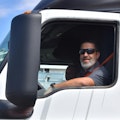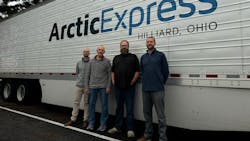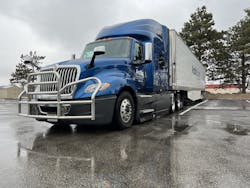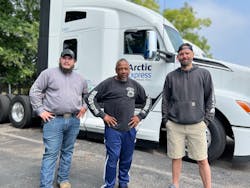Reefer remake: Arctic Express a picture of success worth seeing again
From the post-deregulation explosion of carriers to the demand-destroying Great Recession and the COVID-19 slowdown, Richard Durst has seen it all during his long trucking career. The names and places change, as do the underlying social dynamics, but the structure remains the same, just as it does in the endless stream of Hollywood remakes.
The current act involves soft refrigerated freight market-crushing rates. The antagonists include overcapacity—resulting from the influx of trucks in the post-pandemic spot-market high—and painful food inflation. “How many times have we seen this movie?” quipped Richard, co-founder, president, and CEO of Arctic Express.
“Over and over and over again in my 42 years.”
That’s why Richard, 75, isn’t overreacting. A freight flurry follows every lull, and he already knows his family-owned and -operated firm can endure the most difficult of circumstances, including a bankruptcy and years-long reorganization in the late 1990s and 2000s that would have defeated a less-dogged defender. More recently, Arctic Express emerged from the global health crisis with its long profitability streak intact. Richard expected the Hilliard, Ohio-based business to finish in the black for the 13th consecutive year in 2023.
“We’ve seen our share of ugly,” he confided to Refrigerated Transporter. “This isn’t an easy business. It’s not for the faint of heart. You’ve got to be tough-minded and determined—or you’re not going to survive.”
One also needs to plan ahead. That’s why the refrigerated carrier continues to rework its carefully scripted business model while also optimizing operations with fresh perspectives, paying close attention to industry-shaping technologies and ensuring its people star in many sequels to come with critical succession plotting.
“At some point, the soft freight market will correct itself,” said Matt Durst, VP of administration and Richard’s middle son, who last year joined his dad and two brothers in the business after 18 years in public education. “A wise person once said, ‘cheap freight solves cheap freight,’ because everybody won’t weather the storm. So now we’re making sure we’re in position to capitalize when rates go back up.”
Family matters
That’s what Richard did four decades earlier—while having a bad day. So, with a wife, two young boys, and a third on the way, he left his predictable, well-paying manufacturing job to start a trucking company in 1981. At least that’s what he tells people with a wink. In truth, deregulation created an opportunity he and partner Richard Gromlovits seized when they obtained their operating authority as G&D (Gromlovits and Durst) Transport and began pulling flatbeds loaded with pump jacks from Ohio to oil patches in Texas, Oklahoma, and Kansas.
“It was a crazy time to be making a significant change and branching out on his own, but they got through those early years,” said Mike Durst, chief operating officer, who joined the business seven years ago after 15 years in pastoral ministry.
They survived by adapting. Richard, who bought out his partner in 1983, quickly realized open-trailer hauling was “feast or famine,” so he pivoted to dry and refrigerated vans, and later all reefers, to improve efficiency and insulate the business from the highs and lows of the freight economy. “We figured if anything in this industry is certain, it’s the fact that people need to eat,” Richard recalled. “So we got into hauling food.”
By the early ’90s, that’s all drivers hauled, so in 1992, Richard held a name-the-company contest, which Kris Kronenberg—who still works for the company in accounting—won when she suggested Arctic Express. By 1996, the carrier was coordinating 576 tractors and 845 refrigerated trailers.
Jay, 47, director of safety and Richard’s eldest son, entered the operation out of college in 1999. Mike, 41, joined them in 2016, and Matt, 44, left his job as Granville (Ohio) High School principal for the family business last year, bringing a fresh perspective with him. While Jay emphasizes relationships—and Richard’s the hard-working entrepreneur—Mike is more analytical, and Matt falls somewhere in between. “Matt and I are more systematic,” Mike elaborated. “We want to build systems and create processes, so whether Richard is available or not, people know what decisions to make in different situations.”
Richard isn’t planning to walk away. “I’d be bored to tears,” he confessed. But to better protect the business, the family also went through a year of succession planning with two attorneys in 2021, not to “push [Richard] out the backdoor,” Mike explained, but to preserve his knowledge and establish a path forward for future generations. Richard said the process gave his wife Karen valuable peace of mind. Matt said it did the same for the brothers. “My parents have spent an unbelievable amount of time building this business, so we needed to have certainty as to what was going to happen,” he said.
The family settled on gifting as the most “financially stable” path forward.
“Now, that’s proving to be a wise decision because 2023’s been a tough year,” Mike said. “The market’s down, broker rates are way off, and freight is soft. Having gone through that process and not creating a buyout burden the company must achieve every month, every quarter, or every year has certainly been beneficial.”
Model operation
The company already survived much tougher years.
In 1997, the Owner-Operator Independent Drivers Association sued Arctic Express, Prime, and several other trucking companies over money withheld for maintenance in their lease-purchase agreements. Arctic Express’ position was that the accrued money stayed with the original truck to pay for future repairs when a driver moved to a new leased truck. OOIDA wanted the escrow money to go with the driver.
Richard spent millions defending Arctic Express over the next six years. But when he learned the presiding judge intended to render a judgment against the carrier in the $11 million to $16 million range—which would have put them out of business—he filed for Chapter 11 bankruptcy protection. The company ended up settling with OOIDA, spending one year in Chapter 11 and the next five in a reorganization plan, finally emerging at the end of 2009, when the economy was still reeling from the Great Recession. But armed with a consultant’s new business model, the company returned to profitability in 2011—and never looked back.
“It’s by the grace of God we’re still here,” said Richard, who went several years without a day off to preserve the business.
Arctic Express now uses only company drivers, avoids unproductive routes, and runs a “rightsized” vehicle fleet of 75 tractors and 117 reefer trailers. “We are a small family-owned business, and we don’t need to be a $100 million a year company in order to be successful,” Richard said. For him, success means appeasing creditors—Arctic Express generated $18.6 million in revenue in 2022—and providing stability for his growing family and the company’s 90 employees (67 drivers), who enjoy first-class benefits and open-door access.
“I don’t know why people kept coming to work during those deep, dark times, but they did,” Matt maintained.
“They’re unbelievably loyal to my dad.”
They’re also unabashedly grateful. Arctic Express was among 95 driver-nominated finalists in the 2023 Best Fleets to Drive For contest from CarriersEdge and the Truckload Carriers Association. “We’ve come a long way,” Richard reflected. “A lot of people have worked very hard to try to make this company a great place to work—and I truly believe we are.”
Profitable stability
Today, Arctic Express serves customers in Dallas/Fort Worth—the only place it goes in Texas—Iowa, Wisconsin, Illinois, and the East Coast. The carrier does not go to California, Canada, or anywhere that doesn’t make sense. “We know where we want to run our trucks, and we only go to those places,” Richard said. Typically, that entails moving fresh and frozen meat, including beef, chicken, and pork, from a production facility to a distribution center and rarely chasing produce. “We focus on products that are moving 52 weeks a year,” Mike said.
“By focusing on those businesses that produce a food product all year long, we’ve been able to bring stability to the operation.”
That doesn’t mean they’re immune to market fluctuations.
“Rates have really, really dropped,” Matt said. “It has been significant… and I don’t think we’ll see anything until 2024 in terms of rate increases.” Richard said they see “a shortage of good, solid, consistent contract freight” despite hauling food, forcing them to secure more brokered freight than preferred, especially on backhauls. But they’re still winning new business and lanes by providing reliable, personalized service. Matt said they added 14 lanes over the last three months while staying selective with their bidding. “It’s a lot of fun to win lanes when it’s so hard to do so,” he said. “That’s a good feeling.”
The carrier also maintains profitability in a soft market by optimizing processes and maximizing driver productivity. Key to that was joining the TCA Profitability Program (TPP). “The analytics we receive on the financial data we report to the program have been incredibly influential in the decisions we’ve made since 2018,” Mike said.
One example is the use of analytics to drive a more competitive RFP process. Scott Smith, Arctic Express IT manager, creates monthly spreadsheets with a rolling 12-month look at every load taken, who they hauled it for, and where it went. “It allows us to be more granular and specific as we look at different opportunities,” Matt said.
Driver management
The program also helped decrease driver turnover, in part by increasing the number of drop-and-hook loads from 15% to 50%. However, Mike lamented that driver detention—and proper compensation for detention time—still is a problem. “One of the biggest issues we face in refrigerated transportation is detention—drivers getting stuck places because shippers and receivers are understaffed, short-staffed, or choosing to break down an entire load and reorganize it before they let our driver go,” he said.
With Matt’s assistance and input from every department, the carrier recently instituted regular sit-down, “growth-oriented” conversations between drivers and safety. “Jay is one of the best,” Matt said. “I would put him up against anybody in the industry when it comes to the coaching conversations he has with our drivers.”
Arctic Express also started a monthly miles program in which they work with 10-12 targeted drivers each month on ways to generate more miles in their workweek and add more money to their paychecks.
Matt said the program helped Arctic Express add 13,000 miles in August—generating $40,000 in additional revenue. “We didn’t have to pay for a new truck or hire a new driver; we just worked with the ones we have,” he said.
Drivers also benefit from productivity bonuses, and an innovative referral bonus Matt maintains is “the best in the industry.” On the productivity side, drivers earn an extra 5 cents per mile for every mile traveled when they hit 10,000 miles, 6 cents at 11,000 miles, and 7 cents for 12,000 miles. And they make an extra 2 cents per mile for every driver referred to Arctic Express—for as long as both are employed.
“Matt is really challenging all of us to think outside the box,” Richard said. “That’s what a fresh set of eyes can do.”
Equipment and technology
All Arctic Express Volvo, International, and Kenworth trucks are equipped with Samsara forward- and driver-facing cameras, as well as electronic logging devices to support driver coaching, communications, and safety. The cameras and ELDs are integrated with the carrier’s Innovative Access Plus transportation management system—Trimble’s software-as-a-service offering that still runs on the company’s original IBM AS/400 (now IBM i) platform.
“The platform is old, but it does everything, and as new stuff has been added in the technology world, they’ve kept up with that integration, whether it be EDI [electronic data interchange] for customer orders, status updates, billing, imaging, or maintenance applications,” Smith said.
The system also integrates with Comdata for fuel purchases and tax services and the free apps, such as Genius Scan, that drivers use for scanning and transmitting bills of lading on the road. “It’s arguably more work for drivers because they have to do it in the truck, but they reap the benefits because they get paid faster,” Smith said.
Arctic Express trucks move Great Dane’s Everest refrigerated trailers with Thermo King transport refrigeration units (TRUs), and most of those tractors are spec’d with Cummins engines—because Arctic Express, Cummins, Great Dane, Kenworth, and Thermo King all have facilities on the same street in Hilliard.
“Everybody in the trucking world seemed to gravitate to Lyman Drive … and we were lucky enough to get a spot here,” Mike said. Their proximity makes it easy for mechanics to ask questions or order parts and recently helped Arctic Express score eight new Kenworths. “Another company ordered the equipment but didn’t take all of it, so we were able to scoop up those trucks,” Mike said. “They’re very similar to how we would have designed them, so we were happy to take advantage of that opportunity.”
In addition, the carrier is adding 16 new Volvos as equipment availability improves.
“We couldn’t get as many trucks as we wanted last year, and we certainly didn’t get them when we wanted them,” Mike said. “Deliveries have been delayed this year, but they’ve been closer to schedule than they were a year ago—maybe one to two months out instead of six. So there’s definitely improvement in the supply chain.”
Rolling on
Those improvements give Arctic Express leaders hope as they continue to navigate a challenging environment, including falling rates and rising equipment costs that Richard says are on a “collision course,” persistent inflation, and an ever-rolling recession. “Politicians don’t want to use the ‘R’ word because that causes people to panic, and when people panic, they quit spending, and the economy really does contract,” Richard said. “But the economy is in a recession—and has been almost this entire year.”
That’s one reason they’re not rushing out to buy zero-emission vehicles (ZEVs) despite the fast-approaching, government-mandated deadlines for ZEV and electric TRU adoption. Mike is particularly concerned with how they will protect customers’ products when detained drivers’ electric reefers run out of juice. “I’m not opposed to clean energy,” he said while pointing out that Arctic Express is an EPA SmartWay High Performer. “I’m opposed to things that don’t make sense or aren’t realistic for the users.”
Smith is keeping an eye on the mounting cybersecurity threat and developing technologies, like autonomous vehicles and artificial intelligence, which he maintains are likely to transform the industry. “As a smaller company, we can’t throw a whole lot of money at something and just hope it pans out,” he said. “We want to stay on the leading edge of technology because our customers expect it, but we have to be very careful to stay away from the bleeding edge—because we don’t have that much blood to give.”
And they’re determined to keep all they have in the family by ensuring future generations—including Richard’s eight grandchildren—are well-prepared when it’s their turn to star in the next cycle of trucking dramas.
“If I ever do step back, Mike will take the reins and run the business,” Richard said. “And I know the combination of the three of them [Jay, Matt, and Mike] will make a great team. It’s a hoot working with them. I really enjoy it. Karen and I have been married for 52 years, and she’s jealous. She says, ‘You get to work with our kids every day.’
“So, the guys will be fine when I’m gone. I just don’t plan to leave any time soon.”
About the Author

Jason McDaniel
Jason McDaniel, based in the Houston TX area, has nearly 20 years of experience as a journalist. He spent 15 writing and editing for daily newspapers, including the Houston Chronicle, and began covering the commercial vehicle industry in 2018. He was named editor of Bulk Transporter and Refrigerated Transporter magazines in July 2020.



